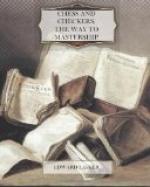(1) P-d4 P-d5 (2) P-c4 P-e6 (3) Kt-c3 P-c5 (4) Kt-f3 Kt-c6 (5) Pxd5 Pxd5 (6) B-f4 Kt-f6 (7) P-e3 B-e6 (8) B-d3 B-e7 (9) o-o o-o (10) R-c1 Kt-h5
(1) P-Q4 P-Q4 (2) P-QB4 P-K3 (3) Kt-QB3 P-QB4 (4) Kt-B3 Kt-QB3 (5) PxQP KPxP (6) B-KB4 Kt-B3 (7) P-K3 B-K3 (8) B-Q3 B-K7 (9) Castles Castles (10) R-B Kt-KR4
CHESS LAWS
If a player having the move touches one of his men he is compelled to move him; if he touches a hostile man he must capture him. This law is void, however, if the man so touched cannot be legally moved or captured.
A man may be moved to any square accessible to him as long as the hand of the player has not left him. If an illegal move has been made it must be retracted and if possible another move must be made with the same man. If a player has castled illegally, King and Rook must be moved back and the King must make another move, if there is a legal one.
If a player touches a man with the sole object of adjusting his position, he must indicate his intention by saying “j’adoube” (French for: I adjust) beforehand. In castling, the King must be moved first as otherwise a doubt might arise whether castling or a Rook’s move only was intended.
A game is void if a mistake has been made in setting up board or men or if in the course of the game the position or number of men have been altered in a manner not in accordance with the rules of play and the position cannot be reconstructed from the point where the error was made.
If a player resigns his game before he is actually mated he acknowledges that in the end mate is unavoidable, and the game is counted as a loss to him.
If neither player has sufficient material left to enforce a mate (compare following chapter) the game is considered a draw. A draw may also be claimed by either player if the moves are repeated so that the same position occurs three times with the same player on the move, or if fifty moves have been made without the capture of a man or the move of a Pawn.
II
ELEMENTARY TACTICS
The beginner who thinks he ought to be able to play a good game of Chess after learning the moves of the men is like the soldier who is confident that he could lead an army after he has learned how to march.
He may have great strategical gifts but he will not be able to use them to any advantage unless he is thoroughly conversant with the tactical possibilities afforded by the cooperation of the different units of which his army is composed and by the topography of the ground on which the battle takes place.
The different conditions of the battle ground in war which make some positions more easily accessible to infantry than to artillery and vice versa have their equivalent on the Chess board in the different ways in which the men move and which make certain squares accessible to some of them which others cannot reach.




